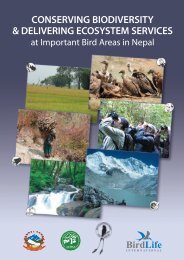What do conservation practitioners want from remote sensing?
Report: What do conservation practitioners want from remote sensing?
Report: What do conservation practitioners want from remote sensing?
- No tags were found...
You also want an ePaper? Increase the reach of your titles
YUMPU automatically turns print PDFs into web optimized ePapers that Google loves.
British Trust for Ornithology (BTO): Monday 1st February 2010<br />
The BTO is an independent scientific research trust, investigating<br />
the populations, movements and ecology of wild birds in the British<br />
Isles. In a partnership between amateurs and professionals, the<br />
BTO conducts high-quality, impartial research in field ornithology<br />
and provides scientific evidence and advice on priority issues in<br />
bird <strong>conservation</strong>.<br />
Attendees:<br />
Ali Johnston<br />
David Noble<br />
Gavin Siriwardena<br />
Graham Austin<br />
Mark Crick (JNCC)<br />
Rob Robinson<br />
Sarah Moon (CCI)<br />
Simon Gillings<br />
Staffan Roos (by phone)<br />
Stuart Newson<br />
Tim Harrison<br />
Introduction<br />
This workshop was held as part of Cambridge Conservation Initiative (CCI) collaboration on <strong>remote</strong><br />
<strong>sensing</strong> through the CCI Shared Challenges Project. This work will consist of the following stages:<br />
1. Discuss the unrealised potential value of <strong>remote</strong> <strong>sensing</strong> data in addressing problems in<br />
biodiversity <strong>conservation</strong> policy and practice with experts on <strong>conservation</strong> policy and<br />
practice in interested CCI member organisations. This is being <strong>do</strong>ne by means of a series of<br />
workshops at each of five organisations.<br />
2. Synthesis of results <strong>from</strong> all of the workshops into a User Needs Assessment which lists<br />
potential applications and identifies the obstacles to their realisation. This stage will include<br />
discussion with <strong>remote</strong> <strong>sensing</strong> technical experts in CCI partner organisations, including the<br />
University of Cambridge<br />
3. Communication of the results of the User needs Assessment to centres of excellence in<br />
<strong>remote</strong> <strong>sensing</strong> techniques and large-scale data processing. This aims to find specialists in<br />
these areas who would be willing to talk to <strong>conservation</strong> <strong>practitioners</strong> and policy experts.<br />
4. Workshop at which <strong>conservation</strong> <strong>practitioners</strong> and policy experts attempt to identify useful<br />
projects that could be implemented immediately and otherwise to inform research and<br />
development on the most important unresolved questions.<br />
The workshop began with a power point presentation by Sarah Moon (on behalf of Graeme Buchanan)<br />
which outlined the principles of <strong>remote</strong> <strong>sensing</strong> and examples of <strong>remote</strong> <strong>sensing</strong> applications to<br />
<strong>conservation</strong> problems. Then attendees were asked to discuss some of their needs <strong>from</strong> <strong>remote</strong><br />
<strong>sensing</strong> data and ideas for new applications.<br />
Points <strong>from</strong> the discussion are below, divided into i) Broad points about the applicability and usefulness<br />
of <strong>remote</strong> <strong>sensing</strong> ii) Needs <strong>from</strong> CCI – what could CCI <strong>do</strong> as a collective community to help inform and<br />
progress use of <strong>remote</strong> <strong>sensing</strong> data in Cambridge iii) User needs <strong>from</strong> <strong>remote</strong> <strong>sensing</strong>.<br />
1. Broad/fundamental points:<br />
<br />
All agreed that presenting user needs cases to <strong>remote</strong> sensors and data providers will be<br />
useful. Being clearer about what sort of things we <strong>want</strong> will ensure that they <strong>do</strong> not dismiss<br />
useful data as ‘noise’<br />
25




